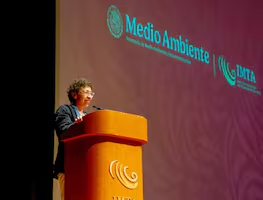Más Información

¿Quién le teme a Donald Trump en China?; “México debería ser nuestro amigo”, dicen chinos desde el paraíso de la piratería

FOTOS Bendicen lomitos, michis, conejos y hasta gallinas por San Antonio Abad; “son parte de nuestras vidas”, explican

Patricia Herrera es la nueva directora de Instituto Mexicano de Tecnología del Agua; Bárcena le da la bienvenida

Con dibujos, niños migrantes retratan sus sueños y miedos; “quiero estar junto a mi mamá y mi hermana”, piden
We are witnessing an unprecedented attack against one of the most treasured Republican values, from within the head of the Republic. Such attack deems the media as a public enemy doomed by the White House for exposing U. S. president, Donald Trump, faux pass and which has been banned from the right to inquire, the latter being the fundamental and basic tool of any journalist.
At the same time, we also bear witness to the legitimizing attempt of a communication policy based on lies and which has been referred to as “alternative facts”, under the assumption of the arrival of the “post-truth” era. Similarly, we are seeing the extreme cynicism of a president that rates the media that expose his falsehoods as “fake news” in the extreme of the Orwellian anti-Utopia which has been christened as “Trumptopia” by The New York Times.
In response to this pathological politics, we attest the rescue of the watchdog function of the media in its reinvigorated form, with its team of fact checkers who have brought tens of false statements from Trump out into the open in just a few weeks of his administration. Despite the present intimidating conditions, the balance of media resistance is far from deplorable by underscoring the survival of the media as a counterweight ofpower, instead. Without doubt, this crisis has underlined a weakness of the U.S. president: his incapacity to respond to the challenges of public communication and of the relationship with the media, in a system which has largely been administered from within the presidential press office for decades.
The media resistance has broken down several Trump cabinet appointments, despite U.S. Congress majority, and has the Attorney General against the ropes.
Against the media, through social networks
Additionally, a weakness of the media has also been exposed in as much the traditional media have lost their privileges of defining the public agenda, as they now share that power with the social media. A weakness calculated in cost-benefit terms of the presidential rampage against the media.
Social media has become a massive fishing zone of Trump from day one of his campaign, from where he has established the agenda of the consensus along with his digital followers, without any ethics nor fact checking mechanisms. We are dealing with closed, self-referential communities who repel the analysis and contrast of their prejudices and which are largely based on the single presidential rhetoric and a mono-thematic frame of mind. It is here where Trumptopia has been endorsed by forging of a new public morale, in which the fact-checking of real facts against “alternative facts” lose ground, in as much the perturbed emotions of the Trump electorate remains nurtured: the fears, hatred, and resentment of the other.
Trump’s clash with traditional media is asserted in that, the presidency remains unpunished today, after 132 falsehoods have been challenged and verified in a month of the Trump administration, hailing it firm against the media, which fails to dictate the topics in the public agenda as well as their appraisal, while in the past, The Washington Post and its finding of the White House lies regarding the Watergate brought Richard Nixon down and almost did the same with Bill Clinton during the Lewinsky affair.
A path of perennial collision
Public and private pressure has always surrounded the media, even in countries with a larger democratic tradition. However, Trump’s politics of abuse and discredit of the press as a method to inhibit and eventually control it have remained present as demons of the establishment that need to be targeted. Trump seems to have underestimated the media reserves to resist the attacks and to recover part of the ground given to the social media.
With or without Trump it is desirable that the tension between media and public spheres cease as attested by the state regulation norms which have spanned for over two centuries with the aim of providing a proper press performance in market democratic societies. Hence the global upheaval caused by Trump’s desertion of this ideal and his disruption of these norms.
José Carreño Carlón is Director General of Mexican publishing house, Fondo de Cultura Económica
bg






